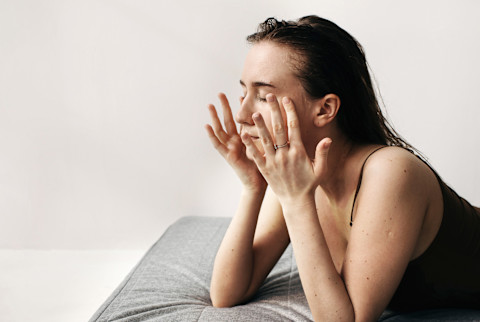How Nightmares Affect Cortisol Levels During The Day & What To Do About It

Nothing causes you to wake up on the wrong side of the bed quite like a nightmare. And now, thanks to new research out of Germany1, we have an explanation for why exactly that is.
In the recent study, researchers found that nightmares can cause an increased cortisol awakening response (CAR), among other things. Here's what the insight means for the sleep-stress connection, plus how to turn your morning around if a nightmare got the best of you.
How researchers studied the effects of nightmares on cortisol levels.
For the study, researchers gathered 30 volunteers who reported having frequent nightmares to see how the nightmares affected their cortisol awakening response, or CAR. The CAR is a part of the circadian rhythm that causes a spike in cortisol within the first hour of waking. We tend to release even more cortisol when we're stressed—and all this extra stress hormone can cause mood fluctuations, weight gain, gut issues, etc.
For two weeks, participants provided saliva samples and answered questions about their sleep and any nightmares. After a reported nightmare, researchers compared CAR measurements to the ones collected after neutral dreams.
What they found.
As you might imagine, nightmares not only spiked the CAR of participants, but they also caused a reported decrease in mood and overall health, compared to neutral dreams. Things like rumination, health complaints, and reduced sleep quality were also reported. And these effects carried into the day upon waking up.
Based on the findings, the team suggests that factors affecting sleep, namely nightmares, contribute to varying levels in the CAR every morning—big news for anyone who often wakes up in the morning feeling anxious.
"This has important methodological implications for CAR studies in general," the study authors note, "and might have even more relevance for studies in clinical populations suffering from chronic sleep disturbances."
How to stave off nightmares and other sleep disturbances.
If nightmares (and the subsequent stressful mornings) are a consistent problem for you, there are a handful of things you can try to achieve a more restorative night's sleep.
For starters, a magnesium supplement like mbg's sleep support+ can help manage stress and promote a steady state of relaxation before bed.* "One great way to ease yourself into sleep is via calming adaptogens and magnesium supplements," integrative immunologist Heather Moday, M.D., previously tells mbg. "I particularly love sleep support+ by mindbodygreen, which features magnesium glycinate, which can promote relaxation.*"
If nightmares are still an issue, you may want to check the thermostat: "We see experimentally that individuals sleeping in warmer rooms (70°F or higher) are more prone to worrisome dreams and fitful sleep," author of Sleep for Success! Rebecca Robbins, Ph.D., notes.
Once morning rolls around, if you're still feeling that nightmarish anxiousness pumping—skip the coffee and opt for an energizing workout or yoga flow to burn off that energy instead, or try a morning meditation to come back to baseline.
Nightmares happen, but we don't have to let them ruin our day, too. By setting ourselves up for a good night's sleep and nailing our morning routine, we can conquer any nightmare and the day ahead.

